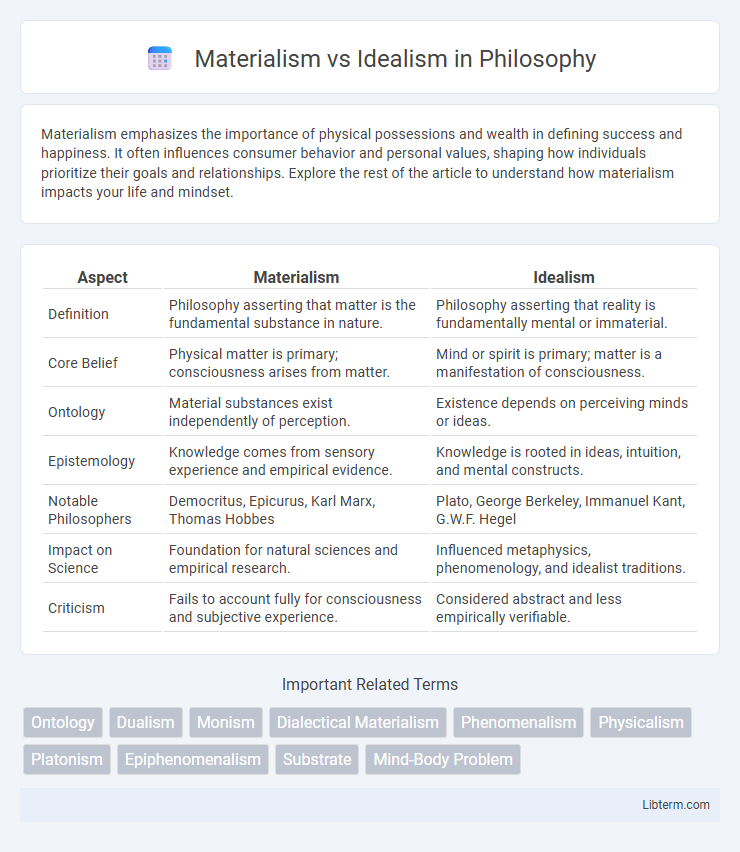Materialism emphasizes the importance of physical possessions and wealth in defining success and happiness. It often influences consumer behavior and personal values, shaping how individuals prioritize their goals and relationships. Explore the rest of the article to understand how materialism impacts your life and mindset.
Table of Comparison
| Aspect | Materialism | Idealism |
|---|---|---|
| Definition | Philosophy asserting that matter is the fundamental substance in nature. | Philosophy asserting that reality is fundamentally mental or immaterial. |
| Core Belief | Physical matter is primary; consciousness arises from matter. | Mind or spirit is primary; matter is a manifestation of consciousness. |
| Ontology | Material substances exist independently of perception. | Existence depends on perceiving minds or ideas. |
| Epistemology | Knowledge comes from sensory experience and empirical evidence. | Knowledge is rooted in ideas, intuition, and mental constructs. |
| Notable Philosophers | Democritus, Epicurus, Karl Marx, Thomas Hobbes | Plato, George Berkeley, Immanuel Kant, G.W.F. Hegel |
| Impact on Science | Foundation for natural sciences and empirical research. | Influenced metaphysics, phenomenology, and idealist traditions. |
| Criticism | Fails to account fully for consciousness and subjective experience. | Considered abstract and less empirically verifiable. |
Introduction to Materialism and Idealism
Materialism asserts that physical matter is the fundamental substance in nature, and all phenomena, including consciousness, arise from material interactions. Idealism posits that reality is primarily shaped by mind, ideas, or consciousness, suggesting that material objects depend on mental perceptions for their existence. Both philosophies address the nature of reality, with materialism emphasizing empirical evidence and idealism focusing on metaphysical interpretations.
Defining Materialism: Core Principles
Materialism asserts that physical matter is the fundamental substance of reality, with all phenomena, including consciousness and thought, arising from material interactions. Core principles emphasize that everything that exists is measurable and explainable through physical laws without reliance on supernatural or spiritual elements. This philosophy underlines empirical evidence and scientific inquiry as the primary means of understanding the universe.
Idealism Explained: Central Concepts
Idealism posits that reality is fundamentally shaped by minds, consciousness, or ideas, rather than material objects. Key concepts include the primacy of mental phenomena, the belief that sensory experiences depend on perception, and the notion that the physical world is a manifestation of a deeper, non-material reality. Philosophers like George Berkeley argue that existence is contingent on being perceived, emphasizing the role of the mind in constructing reality.
Historical Roots of Materialism
Materialism traces its historical roots to ancient Greek philosophers like Democritus, who proposed that matter is the fundamental substance of reality. The Enlightenment further advanced materialism through thinkers such as Thomas Hobbes and Karl Marx, emphasizing physical matter and economic conditions as the basis of existence. This philosophical tradition contrasts with idealism by asserting that material conditions shape consciousness, not the reverse.
The Evolution of Idealist Thought
Idealist thought evolved from early Platonic concepts emphasizing reality as mentally constructed, transitioning through German Idealism where philosophers like Kant and Hegel posited that knowledge and existence are shaped by the mind's structures. This philosophical evolution highlighted the primacy of ideas and consciousness over material substance, contrasting sharply with materialism's emphasis on physical reality as fundamental. The development of idealism influenced fields like metaphysics, epistemology, and even modern cognitive science by prioritizing the interpretive role of the mind in perceiving and shaping reality.
Major Philosophers: Materialists vs Idealists
Materialists such as Karl Marx and Thomas Hobbes emphasize the primacy of physical matter and economic conditions in shaping reality and human experience, asserting that material forces drive societal development. Idealists like Georg Wilhelm Friedrich Hegel and Immanuel Kant argue that consciousness, ideas, and perceptions fundamentally construct reality, positioning mind or spirit as the primary substance of existence. The philosophical debate between materialism and idealism centers on whether the external material world or internal mental constructs constitute the fundamental nature of reality.
Materialism in Modern Science and Technology
Materialism in modern science and technology asserts that physical matter and energy constitute the fundamental components of reality, influencing the development of empirical methodologies and technological innovations. This philosophy underpins advancements in quantum physics, neuroscience, and artificial intelligence by prioritizing observable phenomena and measurable data over metaphysical speculation. Materialism drives the design of technologies like neuroimaging and machine learning, which rely on tangible, material processes to model and replicate cognitive functions.
Idealism’s Impact on Culture and Ethics
Idealism profoundly shapes culture and ethics by emphasizing the primacy of ideas, values, and consciousness over material conditions. It fosters cultural development through the promotion of moral principles, artistic expression, and the pursuit of universal truths, influencing social norms and ethical frameworks. Philosophers like Plato and Kant highlight how idealism encourages the belief in an objective moral order, guiding human behavior and societal progress.
Debates and Criticisms: Materialism vs Idealism
Debates between Materialism and Idealism center on the nature of reality, where Materialism asserts that physical matter is the fundamental substance, while Idealism posits that consciousness or mind shapes existence. Critics of Materialism argue it neglects subjective experience and the primacy of mental phenomena, whereas opponents of Idealism challenge its reliance on immaterial entities and potential detachment from empirical evidence. These philosophical disputes underscore ongoing tensions regarding the relationship between mind and matter in metaphysical inquiry.
Contemporary Relevance and Future Perspectives
Materialism, emphasizing physical reality as the foundation of existence, drives technological innovation and empirical sciences, shaping contemporary advancements in AI, neuroscience, and quantum physics. Idealism, asserting that consciousness and ideas constitute fundamental reality, influences emerging discussions in philosophy of mind, virtual reality, and ethical frameworks for AI, highlighting the role of perception and meaning. Future perspectives suggest a growing integration of materialist and idealist paradigms, fostering interdisciplinary approaches to understanding consciousness, reality, and the ethical implications of technological progress.
Materialism Infographic

 libterm.com
libterm.com